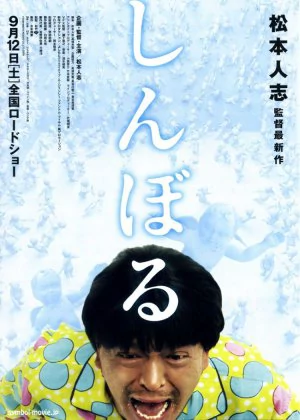Symbol

Talk to anyone who's already had the pleasure of watching Hitoshi Matsumoto's Symbol [Shinboru] and they will warn you it is best to go in knowing as little as possible. Which, by the way, might actually explain the lack of reviews for this film, even on the web. And truth be told, reviewing Symbol really isn't a very easy task, yet Matsumoto's film deserves all the attention it can get, so here goes.
![screen cap of Symbol [Shinboru]](/thumbs/img/articles/1200xauto/symbol-1.webp)
Matsumoto is the mastermind behind Big Man Japan, a small film that made a bunch of avid fans amongst a tiny group of die-hard film fans. His first film turned out to be a slap in the face for many who believed they liked their humor served dry, as Matsumoto took the concept a couple steps further and out-freaked a big portion of his audience. With Symbol, he is back to tease his fans, but does so in a more accessible and easy-going way, making sure this film is less certain to alienate its core audience.
Symbol is a little difficult to describe. When going the name-dropping route, think Gen Sekiguchi (of Survive Style 5+ fame) redoing Kubrick's 2001: A Space Odyssey. If your mind can't quite handle that, no worries, Symbol is a film that simply needs to be experienced first-hand. There's a fair amount of dry humor in the form of a seemingly unrelated tale of Mexican wrestlers, but the main portion of the film is way more direct and in your face, often slapstick at times.
Matsumoto plays an unnamed character waking up in a white room. Completely empty, void of any presence whatsoever, except his own. When taking a closer look around, Matsumoto finds a little switch sticking from one of the walls. In no time switches are popping up everywhere, each of them opening hatches and dropping seemingly random stuff inside the room. Completely baffled (can you blame the guy?), he starts to find his way out of the room.
![screen cap of Symbol [Shinboru]](/thumbs/img/articles/1200xauto/symbol-2.webp)
On a visual level, Symbol is absolutely striking. The scenes in Mexico are warm and gritty, a big contrast with the extremely clean and controlled vibe coming off from the white room. There's a fair amount of CG which is either very functional or simply neat, but never intruding or detracting from the overall atmosphere. Matsumoto also smuggles in a couple of comic book scenes and a truly explosive finale, all contributing to making this film pure visual bliss.
The soundtrack too is great, very supportive of the scenes and often quite funny in its own right. From the silly Mexican song at the start of the film to the angelic "Ah"s coming from the switches, there's always something happening to amuse the audience. Add to that the awesome track featured during the climax and some great tunes during the comic scenes, and you won't hear me complain anymore about the relative bore most Japanese soundtracks are nowadays.
As for the performances, the Mexican actors do a solid job, but the main attraction is of course Matsumoto himself. He takes up the lead role again and does so with style. He has a range of superb expressions and great comedic timing, making sure that no gag stretches out too long and no pun is left hanging without a good visual punchline.
![screen cap of Symbol [Shinboru]](/thumbs/img/articles/1200xauto/symbol-3.webp)
Matsumoto could be considered a self-indulgent, even narcissistic man. He plays the lead character in both of his films and considering the nature of his role in Symbol you may start to think that he likes himself just a little too much. Which could just as well be the case, but similarly to Kitano the man knows to bring it in such a way that audiences simply won't be too bothered with it. He's just that good.
Even though there are plenty of solid gags on display here, it's not so much the puns and jokes that make Symbol such a funny film, but the setting cooked up by Matsumoto. When both story lines finally collide the pay-off is magnificent, but it's still small fry compared to the immensely impressive climax. Very typical for Japanese media (think Otomo's Akira), but not as vague as some people have suggested. A perfect ending shedding a pleasantly different light on all that came before.
Symbol is a rare type of film. Extremely creative, laugh out loud funny, artistic yet easy digestible and leaving you behind with a slightly bedazzled but contented feeling. It's an experience. Matsumoto's sophomore film is even better than Big Man Japan, ranking it safely amongst my all-time favorites. And that's all I'm going to say about it. If you're into strange Japanese comedies, put this on your number 1 spot. If you're not all that familiar with them, make sure you don't miss the chance to see this one if it happens to come your way. Absolutely recommended.